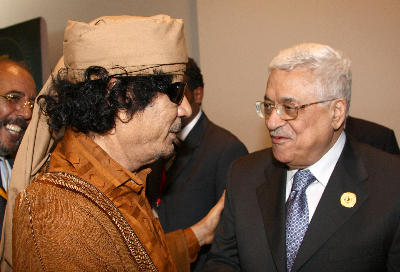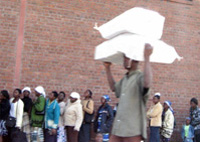 Thaer Ganaim/PPO via Getty Images
Thaer Ganaim/PPO via Getty Images
World News Desk
Learn the why behind the headlines.
Subscribe to the Real Truth for FREE news and analysis.
Subscribe NowThe African Union (AU) held its 11th summit, primarily to discuss the political crisis in Zimbabwe. The result was a call for a national unity government, following the widely condemned run-off re-election of incumbent President Robert Mugabe. To escape the ensuing violence, the challenging opposition leader, Morgan Tsvangirai, had withdrawn a week earlier, taking refuge in the Dutch embassy for more than a week.
The meeting of the pan-African summit highlighted a deep division among the continent’s other countries regarding what to do about the Zimbabwean crisis, particularly Mr. Mugabe, who has historically been considered a “liberation hero.” The summit’s resolution fell short of a much stronger statement wanted by some nations.
According to a Reuters report, Botswana, which borders Zimbabwe’s west, called for Mr. Mugabe to be barred from both the AU and the Southern African regional body SADC. Mompati Merafhe, vice-president of Botswana, said that Mr. Mugabe’s participation in African meetings “would give unqualified legitimacy to a process which cannot be considered legitimate.” He added that the government and opposition must be treated as equal in any mediation. Kenyan Prime Minister Raila Odinga made a similar call.
South Africa, the regional power, resisted the stronger statement for the AU, and called for the crisis to be resolved by the SADC, which it chairs. South African President Thabo Mbeki, however, has been criticized for what has been seen as ineffective mediation and favoritism towards Robert Mugabe.
The Movement for Democratic Change (MDC), an opposition party to Mr. Mugabe’s Zimbabwe African National Union – Patriotic Front (ZANU-PF), issued a statement: “The MDC’s reservations about the mediation process under President Mbeki are well known. It is our position that unless the mediation team is expanded to include at least one permanent representative from the African Union, and the mediation mechanism is changed, no meaningful progress can be made toward resolving the Zimbabwean crisis. If this does not happen, then the MDC will not be part of such a mediation process.”
In addition, French President Nicolas Sarkozy, who just began his six-month presidency of the European Union, said the EU would only accept a Zimbabwean government led by Mr. Tsvangirai, who is generally accepted to have beaten Mr. Mugabe in the first round of the March 29 election.
The AU’s position is tenuous at best, as Mugabe representative George Charamba had earlier rejected any Kenyan-style power-sharing deal, and MDC Secretary-General Tendai Biti more recently said there was no chance of negotiations.
A Christian Science Monitor article pointed out that the AU’s inability to directly rebuke Robert Mugabe regarding an election that its own monitors say “fell short” of AU standards (e.g., due to acts of violence) shows that the body is unable to live up to promises of “African solutions for African problems.”
“This clearly indicates that there are no shared and common values around what good governance is, what democracy is,” said Chris Maroleng, a security analyst at the Institute for Security Studies in Tshwane, South Africa. “A lot of our leaders have questionable democratic credentials, so it’s not surprising that the AU fell short of the mark” (ibid.).
“A government of national unity at this stage is a nonstarter,” Mr. Maroleng added. Unless there is a complete restructuring of the Zimbabwean constitution, a change in the executive powers of the presidency, any power-sharing deal at this point would permanently tilt the advantage, in the favor of Mr. Mugabe. “It’s placing icing over a rotten core. It would look nice, but underneath, it would still be rotten” (ibid.).
In the meantime, the U.S. was preparing a United Nations resolution calling for economic sanctions against Robert Mugabe and 11 of his compatriots, as well as imposing an embargo on arms sales or military hardware to Harare. The position was to express “deep concern at the gross irregularities during the June 27 run-off presidential election (and) the violence and intimidation perpetrated in the run-up to the election that made impossible the holding of free and fair elections” (Reuters).
All the while, the people of Zimbabwe continue to endure severe financial and social hardship.
- Real Truth Magazine Articles
- AFRICA
 Hope for Zimbabwe!
Hope for Zimbabwe!
Other Related Items:
More on Related Topics:
- The West African Sahel Is Becoming a Drug Smuggling Corridor, UN Warns, as Seizures Skyrocket
- Sudan’s War Began a Year Ago. Children Are Among Its Most Fragile Survivors
- Extreme Drought in Southern Africa Leaves Millions Hungry
- Taps Have Run Dry Across South Africa’s Largest City in an Unprecedented Water Crisis


